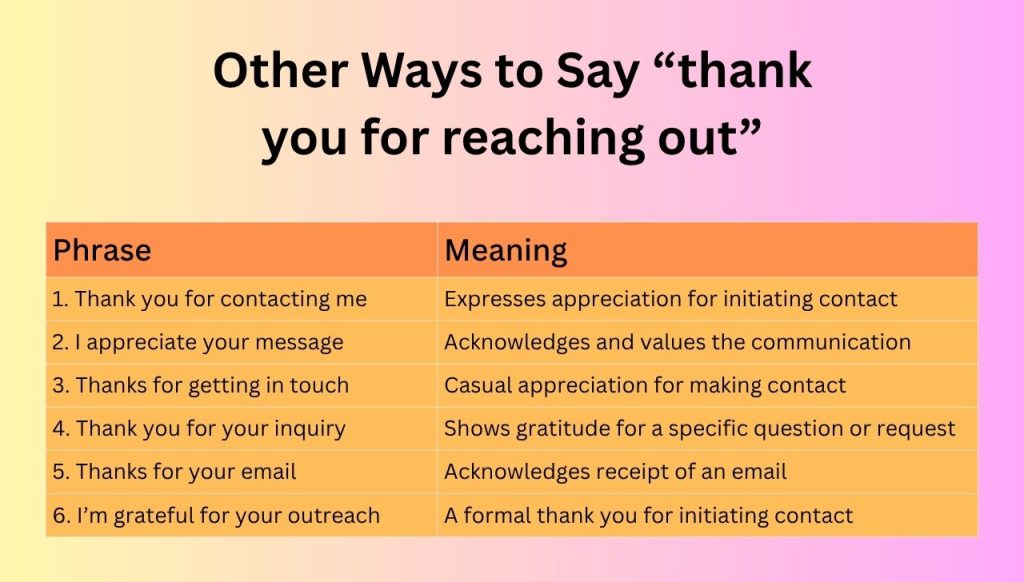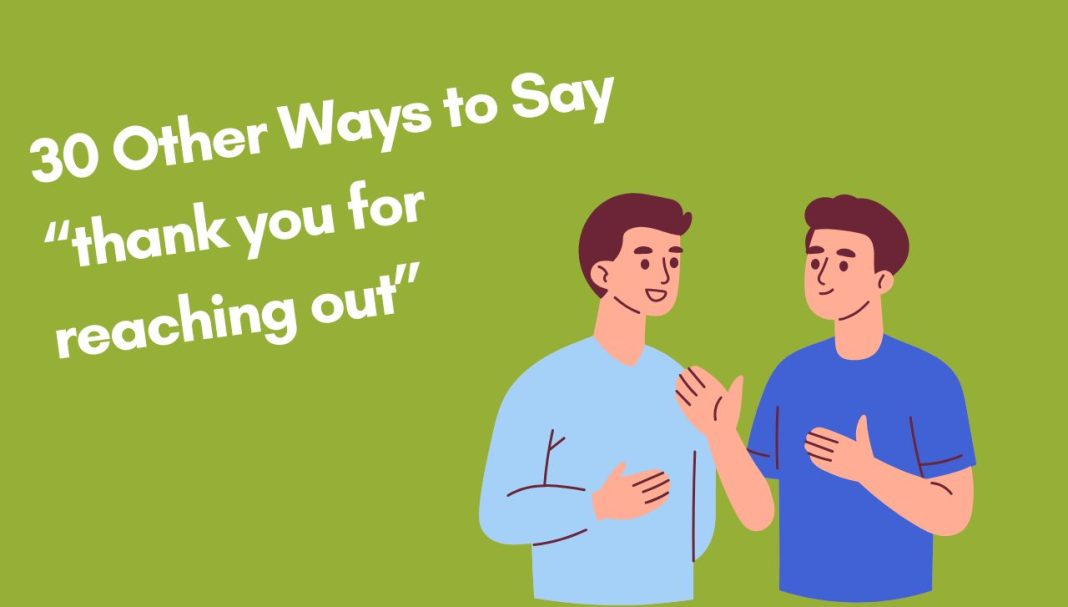When someone takes the time to contact you, it’s important to acknowledge it. While “thank you for reaching out” is common, using different phrases can make your response feel more personal and engaging. Whether it’s an email, call, or message, having various ways to express gratitude can make your communication stand out.
“Thank You for Reaching Out” Meaning
Before jumping into variations, let’s first understand what “thank you for reaching out” means. At its core, the phrase is a polite way of acknowledging someone’s effort to contact you. Whether it’s a question, request, or just to get in touch, someone taking the time to reach out deserves recognition. It’s an appreciation that the individual took action, and you want to convey your acknowledgment of their initiative.
In business, it’s particularly useful for responding to emails or messages from clients, potential customers, or partners. But in informal settings too, you might say it to express gratitude for someone simply checking in.
Example Usage:
- “Thank you for reaching out to me regarding the proposal.”
- “I appreciate you reaching out about this issue. I’m happy to help.”
But of course, variety is the spice of communication, right?
Some of these alternatives are more formal, while others are casual, all conveying the same appreciation. Let’s discuss when and why you might want to use these phrases instead of the standard “thank you for reaching out.”
Discover More: 30 Creative Alternatives to ‘Looking Forward to Seeing You’
When to Use “Thank You for Reaching Out”
Understanding when to use “thank you for reaching out” or its variations is just as important as knowing how to say it. While this phrase can fit in a variety of contexts, it’s especially useful in a few specific scenarios:
Customer Service and Client Interactions
In customer service, acknowledging someone’s attempt to contact you is crucial. A polite, appreciative response sets the tone for a positive interaction, whether a customer is asking about a product, expressing concern, or seeking help with an issue.
Example: “Thank you for reaching out with your concern. I’m happy to assist you.”
Professional Networking
In the professional world, someone reaching out to you for collaboration, job opportunities, or advice deserves a warm yet professional acknowledgment. Using an alternative can help reflect your style while still expressing gratitude.
Example: “I appreciate you getting in touch about potential collaboration.”
Personal Conversations
Even in casual, personal settings, acknowledging someone’s effort to contact you is an important gesture of politeness. Whether a friend checking in or a family member asking for help, responding with appreciation can make your relationships feel more connected and valued.
Example: “It’s great to hear from you! Thanks for checking in.”
After Receiving Compliments or Feedback
When someone reaches out to offer feedback, suggestions, or even compliments, you want to acknowledge their effort to share their thoughts with you. This builds rapport and encourages continued communication.
Example: “Thanks for your kind words and for reaching out to share them with me.”
Why to Say “Thank You for Reaching Out”
Gratitude in communication goes beyond just being polite. It has emotional and psychological benefits for you and the person you’re communicating with.
Builds Stronger Relationships
Gratitude is a key element in building strong, positive personal or professional relationships. When you thank someone for reaching out, you value their time and effort. This simple acknowledgment can set the foundation for future positive interactions.
Example: After receiving a message from a potential client, saying, “Thanks for reaching out. I’m excited to work with you!” establishes a positive tone for future collaborations.
Creates a Positive First Impression
How you respond to an initial contact is crucial, especially in a professional context. A simple “thank you for reaching out” can help to create a positive first impression, showing you’re approachable and appreciative.
Example: “I appreciate you reaching out regarding the job opportunity. I look forward to learning more about your experience.”
Encourages Further Communication
By expressing gratitude, you show that you’re open to continued conversation. It creates a sense of comfort for the other person to reach out again without feeling like they’re being ignored or dismissed.
Example: “Thank you for your feedback. Feel free to reach out if you have more suggestions or questions.”
Fosters a Supportive Environment
Whether in the workplace or personal, gratitude fosters a supportive atmosphere. When people feel appreciated, they are more likely to engage positively, creating a cycle of constructive communication.
Example: “Thanks for reaching out to offer your support. Your help means a lot to me right now.”
Discover More: 30 Ways to Say “Please Note” Differently

Other Ways to Say “thank you for reaching out”
| Phrase | Meaning |
|---|---|
| 1. Thank you for contacting me | Expresses appreciation for initiating contact |
| 2. I appreciate your message | Acknowledges and values the communication |
| 3. Thanks for getting in touch | Casual appreciation for making contact |
| 4. Thank you for your inquiry | Shows gratitude for a specific question or request |
| 5. Thanks for your email | Acknowledges receipt of an email |
| 6. I’m grateful for your outreach | A formal thank you for initiating contact |
| 7. Appreciate you reaching out | Casual and friendly acknowledgment |
| 8. Thanks for your communication | Expresses gratitude for the interaction |
| 9. Thank you for your time | Appreciation for dedicating time to reach out |
| 10. I value your message | Indicates the message is important to you |
| 11. Thank you for connecting | Acknowledges the connection made with someone |
| 12. I’m glad you reached out | Expresses happiness or appreciation for contact |
| 13. Thanks for your feedback | Appreciation for offering feedback or input |
| 14. Thanks for your attention | Acknowledges the effort made to focus on the matter |
| 15. I’m thankful for your inquiry | Formal appreciation for a question or concern |
| 16. Thank you for your follow-up | Shows gratitude for following up on something |
| 17. Appreciate you reaching out to us | Thanks for contacting the company or team |
| 18. Thank you for your support | Acknowledges assistance or support offered |
| 19. It’s great to hear from you | A friendly, warm thank you for contacting |
| 20. Thanks for getting back to me | Acknowledges someone returning a message |
| 21. Appreciate your prompt response | Thanks for replying quickly |
| 22. Thank you for the opportunity | Appreciation for being contacted regarding an opportunity |
| 23. Thank you for keeping in touch | Acknowledges ongoing communication |
| 24. Thanks for your inquiry and time | Appreciation for both the inquiry and the time taken |
| 25. I’m happy to hear from you | Shows excitement or appreciation for the contact |
| 26. Thanks for checking in | Acknowledges a casual follow-up or check-in |
| 27. Appreciate you getting back to me | Thanks for responding to a previous message |
| 28. I’m pleased you reached out | Formal expression of gratitude for contact |
| 29. Thank you for your request | Appreciation for asking for something |
| 30. I’m grateful for your interest | Shows gratitude for showing interest in something |
Conclusion
Switching up your responses keeps things fresh and shows you care. Next time someone contacts you, try one of these alternatives. It’s a simple way to sound genuine and thoughtful.

Grammar Nerd, ESL Trainer, Low-Key Comma Crusader
Daniel has taught English for over a decade, from small community classes in Oaxaca to bustling university halls in London. He has a knack for turning even the driest grammar points into relatable, real-life language tools—think fewer red pens, more real talk. He co-founded Grammation to make grammar less gatekeeper-y and more global. When he’s not decoding sentence structures, he’s probably hiking with a paperback novel or adding unnecessary hyphens for fun.
“The rules of grammar should empower people—not trip them up.”


